-
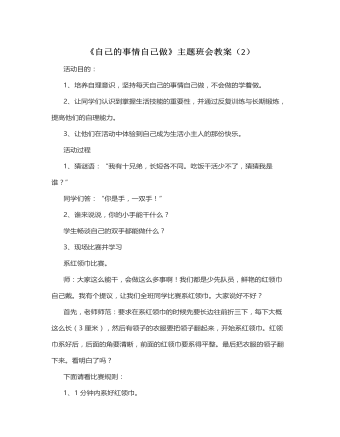
《自己的事情自己做》主题班会教案 (2)
学生欣赏。教师补充讲解。谈谈你有什么感受。同学们,你们勤劳的双手除了做自己的事以外,还为别人做过事吗?师:同学们,你们的小手可真能干 ,会做这么多事情,我们来夸夸自己吧。(学生(齐):嘿嘿,我很棒!)师:我们不但自己的事情自己做,而且还能够别人的事情帮着做。我们的双手会干这么多事情,我真为你们感到高兴。那你们想一想,要是遇到我们不会干的事情,我们又该怎么做呢?学生交流。师:我们不会干的事情一定要学着去做。5、欣赏歌曲《我有一双勤劳的手》6、倡议正如歌曲里的“我有一双勤劳的手,样样事情都会做”下面,周老师提出7条倡议。师:全体起立,请我们班的全体同学从今天开始都能做到:(出示)跟老师一起读。

人教版高中语文必修3《马嵬(其二)》教案2篇
结合历史自古以来,江山美人历来都是引无数英雄豪杰竞折腰的,如果说英雄选择了美人却丢了江山,把所有罪名都归结于“女人是祸水”。但是,纣王无道,和有了妲己有必然的联系吗?有人说妲己坏透了,坏透了的妲己如果不是取得纣王的信任是坏不起来的,纣王听信了妲己的谗言,听与不听决定权在纣王,而不在妲己。强势永远在纣王一边。再来看看西施和杨贵妃:西施是作为越国贡献给吴国的供品来到吴王夫差的身边的,杨贵妃更是先是李隆基的儿媳妇被看中而得宠的。所以,西施和杨贵妃这两个可怜的女人根本没有自己的独立选择,没有独立的爱情,如果没有西施,就会有南施,或北施;如果没有杨贵妃,就会有李贵妃,王贵妃,总之什么施,什么妃是不能少的,因为那是吴王和李隆基的需要。

新人教版高中英语必修2Unit 3 The Internet-Discovering Useful Structure教案二
This teaching period mainly deals with grammar “The Present Perfect Passive Voice.” To begin with, teachers should lead students to revise what they have learned about the Present Perfect Passive Voice. And then, teachers move on to stress more special cases concerning this grammar。This period carries considerable significance to the cultivation of students’ writing competence and lays a solid foundation for the basic appreciation of language beauty. The teacher is expected to enable students to master this period thoroughly and consolidate the knowledge by doing some exercises. 1. Guide students to review the basic usages of the Present Perfect Passive Voice2. Lead students to learn to use some special cases concerning the Present Perfect Passive Voice flexibly.2. Enable students to use the basic phrases structures flexibly.3. Strengthen students’ great interest in grammar learning.1. Help students to appreciate the function of the Present Perfect Passive Voice in a sentence2. Instruct students to write essays using the proper the Present Perfect Passive Voice.观察下列句子特点,总结共同点。1.(教材P28)Much has been written about the wonders of the World Wide Web.2.(教材P28)But the Internet has done much more for people than simply make life more convenient.3.(教材P28)Many people have been helped by the club.4.(教材P28)She no longer feels lonely, and her company has become quite successful.5.(教材P32)Today I thought I’d blog about a question that has been asked many times—how do you stay safe online and avoid bad experiences on the Internet?

新人教版高中英语必修2Unit 3 The Internet-Listening &Speaking&Talking教案二
From the pictures in the text and the title--- choose the best app, we can know that this part is about how to save money by using apps.Step 2 While-listening1. Laura and Xiao Bo are talking about apps. Listen to their conversation and find out what apps they want.Xiao Bo is looking for a(n) exercise app to help him get in shape.Laura would like an app for getting rich and another that will make her grades better.2. Listen again. Are the sentences true T or false F?1). Both of Xiao Bo's apps keep track of the steps he takes._____2). Xiao Bo's second app can help him make a fitness plan._____3). Laura needs an app that will help her get discounts.______4). Laura needs an app that will add money to her bank account._______F T F T3. Listen once more and tick the sentence you hear. Underline the words used to express predictions, guesses, and beliefs.Predictions, Guesses, and Beliefs________It might help me walk more.________My guess is that it wouldn't work.________I imagine this app would help me get fit faster________I suppose that would be good.________I guess you could save a little with this app.________I suppose there would be some problems, too.________I believe this app could help me get thinner.

新人教版高中英语必修2Unit 3 The Internet-Reading and Thinking教案二
Q5:What's Jan's next goal?Her next goal is to start a charity website to raise money for children in poor countries.Q6:What can we learn from her experiences?We learn that when we go through tough times, we can find help and support from other people online. We learn that we can feel less lonelyStep 5: While reading---rethinkingQ1: What is Jan’s attitude to the Internet ?Thankful/Grateful, because it has changed her and her life.Q2: What writing skills is used in the article ?Examples(Jan’s example, the 59-year-old man’s and the 61-year-old woman’s example)Q3: Can you get the main idea of the article ?The Internet has changed Jan’s life/Jan’s life has been changed by the Internet.Step 6 Post reading---Retell the storyMuch has been written about the wonders of the World Wide Web. There are countless articles (1)telling(tell) us how the Internet has made our lives more convenient. But the Internet has done a lot (2)more(much) for people than simply make life more convenient. People’s lives (3) have been changed(change) by online communities and social networks so far. Take Jan for example, who developed a serious illness that made her (4)stuck(stick) at home with only her computer to keep (5)her(she) company. She joined an online group (6)where she could share problems, support and advice with others. She considered the ability to remove the distance between people as one of the greatest (7)benefits(benefit). She was so inspired (8)that she started an IT club in which many people have been helped. She has started to learn more about how to use the Internet to make society better. Her next goal is to start a charity website to raise money (9)for children in poor countries. Jan’s life has been (10)greatly(great) improved by the Internet.

新人教版高中英语必修2Unit 3 The Internet-Reading for Writing教案二
8. However, the more polite you are, the less likely it is you will be attacked. 然而, 你越有礼貌, 你被攻击的可能性就越小。 Step 8 Writing---the articleHow to stay safe in the online chat roomToday I thought I’d blog about a question that has been asked many times--- how do you stay safe online and avoid bad experiences in the online chat room ? I’m not an expert, but many years as a blogger have taught me a thing or two.First of all, there’s the golden rule of the Internet: keep out of what makes you uneasy. Don’t post comments or click on anything. Second, protect your privacy. Don’t give out too much private information like your address, phone numbers, the ID numbers, etc. Third, be polite. If you are polite to others on the Internet, you won’t be attacked in normal situation. Finally, don’t believe in others easily and never meet someone you met online alone. It is very dangerous.Have you had any bad experiences online, or do you have some good advice for staying safe? Post your comments below!Step 9 Pair workExchange drafts with a partner. Use this checklist to help your partner revise his/her draft.1. Does the writer tell the reader what he/she know about the topic ?2. Are the tips and suggestions well organised ?3. Has the writer defined the new words ?4. Does the author include examples, comparison, or explanations ?5. Does the writer end by asking readers to leave comments and/or suggestions ?6. Can you find any grammar or spelling mistakes.Step 6 HomeworkPut up your revised draft in the classroom or read it to your class.

新人教版高中英语必修2Unit 4 History and Traditions-Reading and Thinking教案二
Step 5 While reading---Task 3Read the text again and answer the following questions.Q1: How many countries does the UK consist of ?4 Q2: What are the four countries of the United Kingdom?England, Wales, Scotland and Northern Ireland Q3: Which two were the first to be joined together ?England and WalesQ4: What are the two chief advantages of studying the history of a country ?The first one is to help you understand more about the country and its traditions.The second one is to make visiting it more enjoyable.Q5: What’s the author’s attitude towards studying the history ?Supportive/positiveStep 6 Post reading---Retell the textThe United Kingdom, Great Britain, Britain, England—many people are confused by (1)_____ these different names mean. In the 16th century, the nearby country of Wales (2) __________(join) to the Kingdom of England. In the 19 th century, the Kingdom of Ireland was added to create the United Kingdom of Great Britain and Ireland. Finally, the southern part of Ireland (3) ______ (break) away from the UK, which resulted in the full name we have today. However, most people just use the (4)_________(shorten) name: the UK. The four countries (5)__________ belong to the United Kingdom work together in some areas. There were four sets of invaders and the last group were the Normans. They had castles (6)_________(build) all around England and made changes (7)__________ the legal system. Studying the history of the country will make your visit much more (8)_________(enjoy). The capital city London is (9)___ ancient port city that has a history (10)______(date) back to Roman times. 1. what 2.was joined 3.broke 4.shortened 5.that 6. built 7.to 8.enjoyable 9.an 10.dating Step 6 Homework

新人教版高中英语必修2Unit 4 History and Traditions-Listening&Speaking&Talking教案二
Listening and Speaking introduces the topic of “Take part in a youth project”. The listening text is an interview about "sharing views on historical sites". Through listening to a dialogue between Chinese and foreign students on the way to the Confucius Temple, students can understand their views on the Confucius Temple, Confucius, Confucius' descendants and Confucius' educational thoughts, so as to realize and think about the profound influence of Confucius and his thoughts on Chinese historical tradition. At the same time, the dialogue naturally integrates English idioms and mentions Shakespeare, the British playwright, so as to provide language materials and context for students to understand English idioms and related cultural allusions, as well as to compare Chinese and foreign cultures, which is helpful for students to understand and express the language such as history, tradition, culture and custom significant impact.Text analysis: listening text is a dialogue between a British student and a Chinese student when he goes to the Confucius Temple. When William, a British student, visited the Confucius Temple, he asked Xiao Kong, a Chinese student, for directions. Xiao Kong was just going to the Confucius Temple to meet with the members of the research group, so they went together and exchanged their views on the Confucius Temple, Confucius, Confucius' descendants and Confucius' educational thoughts. From the perspective of foreign tourists, this paper describes their thoughts on Confucius, the great son of Confucius, who had a profound impact on Chinese history and cultural tradition, and his education.Listening and Talking introduces a visit to a historic tourist destination. Tourism is a common way to understand a country's history, culture, and customs and so on. Students listen to the dialogue between Xiao Yan, a youth hostel Usher, and Paul, a backpacker, to learn about Pingyao's famous historical and cultural attractions and Paul's travel experience and experience as a foreign tourist.

新人教版高中英语必修2Unit 5 Music-Discovering Useful Structures教案二
4. When he got absorbed in his world of music, he felt as if he could “see” the beauty of the world around him, like he had in his previous life.P·P as adverbial: _________________________________________________________________.Function: _______________________________________________________________________.Step 5 Solid Complete the passage with the words in brackets in their correct forms.Well known as a successful band, the Impact members show quite a few striking qualities. They never ever give up. When _____________(question) by the media, they are not _____________(discourage) and practise even harder. They are improving themselves by attending several master training class. They are united. _____________(fill with) team spirit, they act as a whole, always aiming for glory. Step 6 Difference and similarity from -ingObserve the following examples.1. He went out, shutting the door behind him.=He went out, ________________________________________________________.2. Not knowing what to do, he went to his parents for help.=__________________________________________, he went to his parents for help.Similarity: _______________________________________________________________________________________________________________________________________________________.Difference : _______________________________________________________________________________________________________________________________________________________.Step Practice1. ________ in a hurry, this article was not so good. 因为写得匆忙, 这篇文章不是很好。2. ________ carefully, he found something he hadn’t known before. 他仔细读书时, 发现了一些从前不知道的东西。3. ________ why he did it, the monitor said it was his duty. 当被问及他为什么要这么做时, 班长说这是他的职责

新人教版高中英语必修2Unit 5 Music-Reading and Thinking教案二
1. Get basic information about Eric; read deeply to understand the history and development of the virtual choir.2. Understand what the function of the virtual choir is and how to make a virtual choir.3. Understand the meaning of some languages in the context of the text through question guidance, such as “Many people do not have close friends or contacts who have the same interest in music.” and so on.Step 1 Leading-in1. Answer the following questions.Q1:Do you know the Apps like Tik Tok and Quick Hand?Q2: Do you want to make a Tik Tok video or a Quick Hand video?2. Play a Tik Tok video Step 2: Understanding the title Q1:What does the title mean ?Q2: Is the article a narration or exposition? Why? Q3: Can you change the title ? If you can, what is the title?Step 3: Scanning the whole text and getting the basic information1. Answer the following questions.Q1:Who came up with the idea for a virtual choir?Q2: Where did Eric studied the musical composition?Q3: What is his song?2. Find the main idea of each paragraph3. Deal with some new words.Step 4: Reading carefully to get detailed informationPara 1 How to make a virtual choir1. PreparationA. tools: a virtual camera; an Internet connectionB. hero/heroin: friends or some individuals who have the same interests2. Process

新人教版高中英语必修2Unit 1 Cultural Heritage-Discovering Useful Structure教案二
This theme of the part is “ Describe people or things in greater detail”. Students have learned the grammar(restrictive relative clauses) in Book 1, and further review and consolidate its structure “prep+relative pronouns(which/whom)” and the relative adverbs(when, where and why), besides students should understand its form, meaning and functions. In this section, students should be able to express the grammar correctly in daily communication and in the writing. 1. Review the basic usages of relative pronouns and adverbs of attributive clauses . 2. Learn to use some special cases about restrictive relative clauses.3. Learn to write sentences with restrictive relative clauses flexibly according to the context.1. Review the basic usages of relative pronouns and adverbs of attributive clauses .2. Learn to use some special cases about restrictive relative clauses.3. Learn tow rite sentences with restrictive relative clauses flexibly according to the context.Step 1. Observe the following sentences, and mark the relative pronouns and the adverbs. 1. After listening to the scientists who had studied the problems, and citizens who lived near the dam, the government turned to the United Nations for help.2. Temples and other cultural sites were taken down piece by piece, and then moved and put back together again in a place where they were safe from the water.Step 2 PracticePlease complete these sentences with relative pronouns and relative adverbs and answer the following questions.Questions: 1. What is the head noun ?2. What relative words should be used ?3. What elements do they act in these sentences ?

新人教版高中英语必修2Unit 1 Cultural Heritage-Reading and Thinking教案二
1. This section focuses on "Understanding how a problem was solved”, which is aimed to guide students to analyze and discuss the challenges and problems faced by cultural heritage protection during the construction of Aswan Dam, as well as the solutions. On the basis of understanding, students should pay attention to the key role of international cooperation in solving problems, and attach importance to the balance and coordination between cultural heritage protection and social and economic development. Students are encouraged to face challenges actively, be good at cooperation, and make continuous efforts to find reasonable ways and means to solve problems.2. Enable students to understand the main information and text structure of the reading text;3. Motivate students to use the reading strategy "make a timeline" according to the appropriate text genre;4. Enable students to understand how a problem was solved;5. Enable students to understand the value of protecting cultural heritage by teamwork and global community;1. Guide students to pay attention to reading strategies, such as prediction, self-questioning and scanning.2. Help students sort out the topic language about protecting cultural relics and understand the narrative characteristics of "time-event" in illustrative style3. Lead students to understand the value of protecting cultural heritage by teamwork and global community;

新人教版高中英语必修2Unit 4 History and Traditions-Discovering Useful Structure教案二
This teaching period mainly deals with grammar: The past participle is used as attributive and objective complement.1. Guide students to review the basic usages of the past participle used as attributive and objective complement.2. Lead students to learn to use some special cases concerning the past participle used as attributive and objective complement flexibly.3. Strengthen students’ great interest in grammar learning.1. Help students to appreciate the function of the past participle used as attributive and objective complement.2. Instruct students to write essays using the past participle used as attributive and objective complement.Step1:温故而知新。Analyze the underlined phrases and then sum up the common usages of the past participles.1.(教材P41)They had castles built(build) all around England, and made changes to the legal system.2.(教材P42)They use the same flag, known(know) as the Union Jack,...3.(教材P42)Judy and I had our car parked(park) in an underground car park near Trafalgar Square, where we could get our car battery charged(charge).Common points: f the past participle used as attributive and objective complement.Step 2:过去分词作定语时的意义1.及物动词的过去分词作定语,在语态上表示被动;在时间上,常表示动作已经发生或完成,有时也不表示时间性。Our teacher watched us doing the experiment and gave us a satisfied smile at last.我们的老师看着我们做实验,最后给了我们一个满意的微笑。The plan put forward at the meeting will be carried out soon.会上提出的计划将很快被执行。2.不及物动词的过去分词作定语,它不表示被动意义,只强调动作完成。Many little kids like gathering fallen leaves in the yard.

新人教版高中英语必修2Unit 5 Music-Reading for Writing教案二
The Internet celebrity Gao Yifeng. Years ago, he owned 5 companies and the staffs over 1,000, but during the economy crisis, he became nothing but debt. He was so worried that his hair became white overnight. There was a time when he wanted to killed himself. But after listening to the song Start Over by Liu Huan, he decided to cheer himself up. He started a steamed bun shop and gradually became a national chain shops. Now he became successful again.Walter Haddon said, “Music is the medicine of a troubled mind.” Music contains such a pleasant and inspiring force. Music gave him courage and bravery. When he listened to the song, it made his spirit fly like a kite in the wind. Music gave him strength and brought him relief. It was the rock I leant on to become strong and to get through those hard times. I hope none of us have to go through the same kind of suffering that he did. At the same time, we all go through various periods when we feel sad or alone. During those times, music can help us in the same way that it helped him. I hope we all will somehow begin to treasure music and make it a part of our life. Thank you for your listening !5.Revise your writing each other.Does he/she explain how music has changed his/her/someone else’s life?Are some of the rhetorical devices included and used properly ?Does he/she talk about how music makes him/her/someone feel?Is the first word in each sentences capitalised?Does he/she use correct punctuation ?
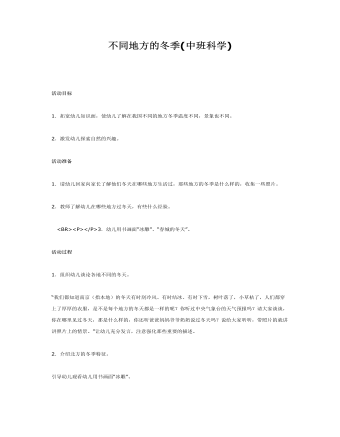
中班科学课件教案:不同地方的冬季
2.激发幼儿探索自然的兴趣。活动准备1.请幼儿回家向家长了解他们冬天在哪些地方生活过,那些地方的冬季是什么样的,收集一些照片。2.教师了解幼儿在哪些地方过冬天,有些什么经验。 <BR><P></P>3.幼儿用书画面“冰雕”、“春城的冬天”。活动过程1.组织幼儿谈论各地不同的冬天。“我们都知道南京(指本地)的冬天有时刮冷风、有时结冰、有时下雪,树叶落了,小草枯了,人们都穿上了厚厚的衣服,是不是每个地方的冬天都是一样的呢?你听过中央气象台的天气预报吗?请大家谈谈,你在哪里见过冬天,那是什么样的,你还听爸爸妈妈爷爷奶奶说过冬天吗?说给大家听听,带照片的就讲讲照片上的情景。”让幼儿充分发言,注意强化那些重要的描述。2.介绍北方的冬季特征。引导幼儿观看幼儿用书画面“冰雕”。“这里的冬天是怎样的?为什么别的地方没有冰雕”(因为这里冬季气温特别低,冰层很厚,几个月不化)3.介绍春城昆明的冬季特征。引导 <BR><P></P>幼儿观看幼儿用书画面“春城的冬天”,介绍昆明实际上一年到头都是春天。冬天也和春天一样,植物繁茂。郁郁葱葱,鲜花盛开,从不下雪,不结冰。人们穿着单薄。“这里有冬天吗?”4.小结。活动延伸观看世界各地冬天的录象。活动目标1.拓宽幼儿知识面,使幼儿了解在我国不同的地方冬季温度不同,景象也不同。2.激发幼儿探索自然的兴趣。活动准备1.请幼儿回家向家长了解他们冬天在哪些地方生活过,那些地方的冬季是什么样的,收集一些照片。2.教师了解幼儿在哪些地方过冬天,有些什么经验。3.幼儿用书画面“冰雕”、“春城的冬天”。
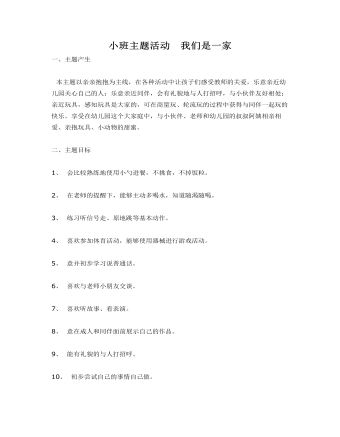
小班主题活动 我们是一家课件教案
二、主题目标1、 会比较熟练地使用小勺进餐,不挑食,不掉饭粒。2、 在老师的提醒下,能够主动多喝水,知道随渴随喝。3、 练习听信号走、原地跳等基本动作。4、 喜欢参加体育活动,能够使用器械进行游戏活动。5、 意并初步学习说普通话。6、 喜欢与老师小朋友交谈。7、 喜欢听故事、看表演。8、 意在成人和同伴面前展示自己的作品。9、 能有礼貌的与人打招呼。10、 初步尝试自己的事情自己做。11、 玩沙玩水游戏中,感受它们的特征。12、 能够比较多少,并按数字的特征进行一维分类。13、 能认识1到10的数字,并能按物点数。14、 意在音乐伴奏下做自己喜欢的模仿动作,表达自己的情感。15、 能够进行简单的撕纸、粘贴等手工活动。16、 能够用横线、竖线进行绘画活动。三、环境准备 1、 教师主动做好 幼儿的“大朋友”,形成和谐、亲密的师幼关系,教师主动使用礼貌用语,影响幼儿2、 设立《好宝宝学本领》专栏,分别以有礼貌、会作操、会吃饭、独立睡觉等形象标志做记录,鼓励幼儿做个好宝宝。3、 提供幼儿园叔叔阿姨工作的图片,如:厨房里的叔叔阿姨在淘米、洗菜、烧饭;花工在拔草、浇花、施肥等,让幼儿感受他们对自己的关爱。四、家园共育1、 与家长交流幼儿入园后的情况,对个别适应慢的幼儿共同分析原因、商讨克服依恋感的办法2、 希望家长能主动亲近幼儿园里的工作人员,与他们打招呼,尊重所有工作人员的劳动3、 家长自身注重文明习惯,在家庭中能使用文明礼貌用语4、 希望家长在家也能培养孩子爱护玩具,自己收拾玩具5、 有条件的家长带幼儿参观玩具商场或玩具柜台,观察玩具摆放 6、 家长可鼓励幼儿从家里带一两样自己喜欢的玩具到幼儿园与小朋友一同分享玩玩具的快乐
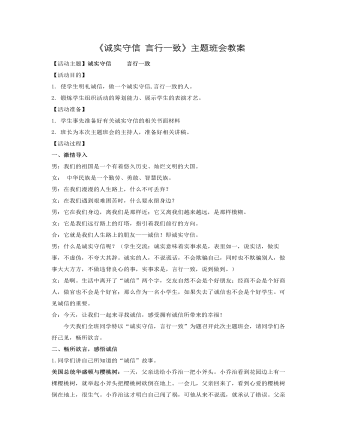
《诚实守信 言行一致》主题班会教案
【活动目的】1. 使学生明礼诚信,做一个诚实守信,言行一致的人。2. 锻炼学生组织活动的筹划能力、展示学生的表演才艺。【活动准备】1. 学生事先准备好有关诚实守信的相关书面材料2. 班长为本次主题班会的主持人,准备好相关讲稿。【活动过程】一、激情导入男:我们的祖国是一个有着悠久历史、灿烂文明的大国。女: 中华民族是一个勤劳、勇敢、智慧民族。男:在我们漫漫的人生路上,什么不可丢弃?女:在我们遇到艰难困苦时,什么要永留身边?男:它在我们身边,离我们是那样近;它又离我们越来越远,是那样模糊。女:它是我们远行路上的灯塔,指引着我们前行的方向。合:它就是我们人生路上的朋友——诚信!即诚实守信。男:什么是诚实守信呢?(学生交流:诚实意味着实事求是,表里如一,说实话,做实事,不虚伪,不夸大其辞。诚实的人,不说谎话,不会欺骗自己,同时也不欺骗别人,做事大大方方,不做违背良心的事,实事求是,言行一致,说到做到。)
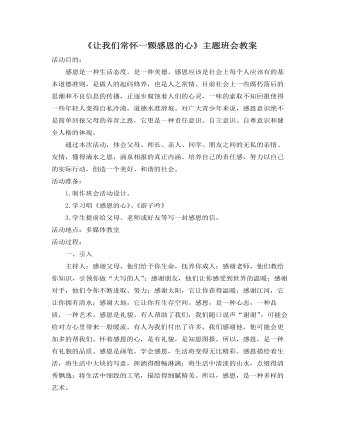
《让我们常怀一颗感恩的心》主题班会教案
一、引入 主持人:感谢父母,他们给予你生命,抚养你成人;感谢老师,他们教给你知识,引领你做“大写的人”;感谢朋友,他们让你感受到世界的温暖;感谢对手,他们令你不断进取、努力;感谢太阳,它让你获得温暖;感谢江河,它让你拥有清水;感谢大地,它让你有生存空间。感恩,是一种心态,一种品质,一种艺术。感恩是礼貌。有人帮助了我们,我们随口说声“谢谢”,可能会给对方心里带来一股暖流。有人为我们付出了许多,我们感谢他,他可能会更加多的帮我们。怀着感恩的心,是有礼貌,是知恩图报。所以,感恩,是一种有礼貌的品质。感恩是画笔。学会感恩,生活将变得无比精彩。感恩描绘着生活,将生活中大块的写意,挥洒得酣畅淋漓;将生活中清淡的山水,点缀得清秀飘逸;将生活中细致的工笔,描绘得细腻精美。所以,感恩,是一种多样的艺术。下面我宣布“让我们都有一颗感恩的心”主题班会现在开始!
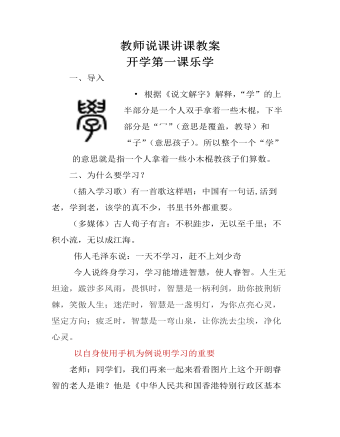
教师说课讲课教案开学第一课乐学
二、为什么要学习?(插入学习歌)有一首歌这样唱:中国有一句话,活到老,学到老,该学的真不少,书里书外都重要。(多媒体)古人荀子有言:不积跬步,无以至千里;不积小流,无以成江海。伟人毛泽东说:一天不学习,赶不上刘少奇今人说终身学习,学习能增进智慧,使人睿智。人生无坦途,跋涉多风雨,畏惧时,智慧是一柄利剑,助你披荆斩棘,笑傲人生;迷茫时,智慧是一盏明灯,为你点亮心灵,坚定方向;疲乏时,智慧是一弯山泉,让你洗去尘埃,净化心灵。
![[幼儿园大班主题教案]我是大班小朋友](https://www.lfppt.com/PPT_IMG/2022-11/30/202211301639077c8cf02581e74c04818cb12bee11f4ae.png)
[幼儿园大班主题教案]我是大班小朋友
一、主题由来及确定: 本次主题的制定主要来自于,我班幼儿由于在同年级年龄较小,且又刚刚进入大班的学习阶段,班级中又来了八名新生。且通过家长会和班级的家长问卷中我们也了解到家长们也非常希望在入大班后自己的孩子能够顺利的进入小学,在大班中能让自己的孩子知道自己上了大班能自觉要求自己,建立起良好的学习常规和学习习惯。在通过与孩子的交谈中我们也发现孩子们对自己上了大班感到非常自豪,也愿意做小中班弟弟妹妹的榜样。因此我们也希望通过此次主题能培养大班幼儿良好的学习习惯,增强集体意识和学习与新同学交往的正确方法,在各种互助互爱的活动中建立和谐融洽的班级氛围。使八名新生与老生友好相处中尽早了解本班的活动材料和各种规则,能较快的适应新的班级生活。二、主题网络: 三、预设教育目标:1、激发幼儿关心、爱护弟妹和小朋友的情感,初步树立关心他们的责任感,体验自己生长的快乐。1、培养幼儿独立生活的能力及自觉遵守课堂纪律的习惯。2、增强幼儿的班级责任意识和任务意识。

